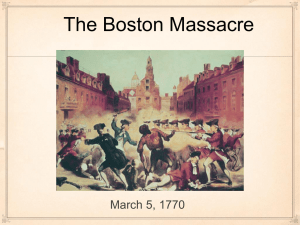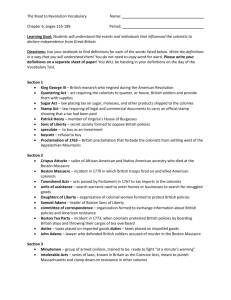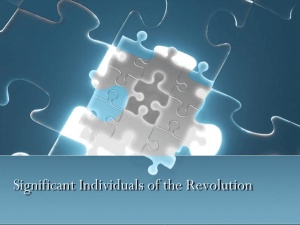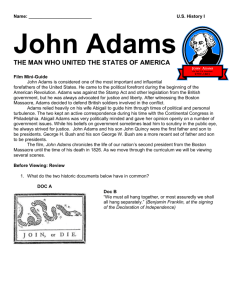Causes of the Revolution Review
advertisement
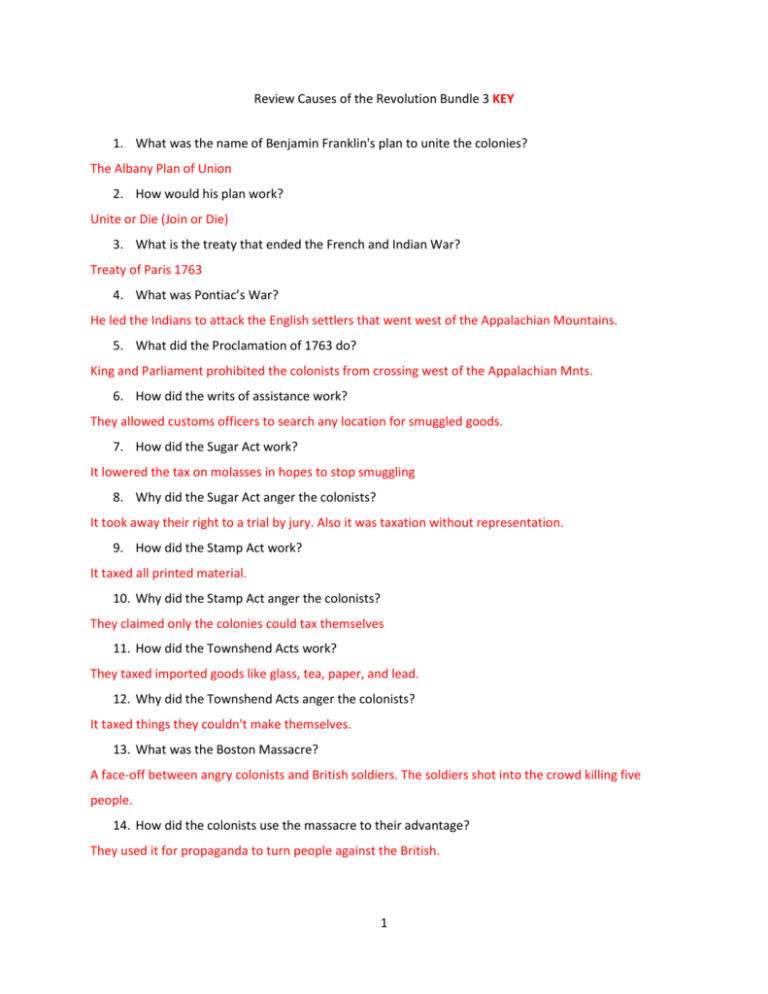
Review Causes of the Revolution Bundle 3 KEY 1. What was the name of Benjamin Franklin's plan to unite the colonies? The Albany Plan of Union 2. How would his plan work? Unite or Die (Join or Die) 3. What is the treaty that ended the French and Indian War? Treaty of Paris 1763 4. What was Pontiac’s War? He led the Indians to attack the English settlers that went west of the Appalachian Mountains. 5. What did the Proclamation of 1763 do? King and Parliament prohibited the colonists from crossing west of the Appalachian Mnts. 6. How did the writs of assistance work? They allowed customs officers to search any location for smuggled goods. 7. How did the Sugar Act work? It lowered the tax on molasses in hopes to stop smuggling 8. Why did the Sugar Act anger the colonists? It took away their right to a trial by jury. Also it was taxation without representation. 9. How did the Stamp Act work? It taxed all printed material. 10. Why did the Stamp Act anger the colonists? They claimed only the colonies could tax themselves 11. How did the Townshend Acts work? They taxed imported goods like glass, tea, paper, and lead. 12. Why did the Townshend Acts anger the colonists? It taxed things they couldn't make themselves. 13. What was the Boston Massacre? A face-off between angry colonists and British soldiers. The soldiers shot into the crowd killing five people. 14. How did the colonists use the massacre to their advantage? They used it for propaganda to turn people against the British. 1 15. What were the Committees of Correspondence? An organization created to spread independence ideas throughout the colonies. 16. What was the Tea Act and why did it anger the colonists? It gave an unfair monopoly (advantage) to the East India Company. Other tea companies had to pay a tax. 17. What was the Boston Tea Party? In protest to the Tea Act the Sons of Liberty dressed up as Indians and dumped the tea into the harbor. 18. What were the 3 parts to the Intolerable/Coercive Acts? It punished Boston for the Tea Party by closing Boston Harbor to business; it banned town meetings, and brought in British soldiers. 19. What are militias and minutemen? Citizen soldiers (not professionals) and minute men could be ready on a minutes notice. 20. Who rode to warn the militia that the British soldiers were coming to Lexington and Concord? Paul Revere and William Dawes 21. Why are Lexington and Concord important? It was the first shot of the Revolution. Later called the "Shot heard 'round the World." 22. What are the odds on Bunker Hill? 3000 British to 1000 Colonists. The British lose about 1000 men. "Don't fire until you see the whites of their eyes." 23. What is the lesson learned about Bunker Hill? The Americans lose the battle but it shows that the war will be a long hard fight. 24. What is the difference between a Loyalist and a Patriot? Loyalists were with England and Patriots were for independence. 25. What is the Olive Branch Petition 1775? A last chance offer to the King for peace in exchange for guaranteeing the colonists' rights. 26. What is a boycott? A protest by refusing to buy goods. 27. What is revenue? It’s money collected. 28. What is liberty? Freedom 2 29. What is an Act? A law 30. What is Parliament? It’s the British government. 31. What is smuggling? Transporting goods illegally. 32. What is an effigy? A rag figure dressed up for someone disliked or hated 33. Who started the Sons of Liberty? Samuel Adams. It was a patriot group that protested the British 34. Who was Patrick Henry? He was a great Orator (speaker). He led the opposition to the Stamp Act. He said, “Give Me Liberty or Give Me Death!” He was later an outspoken Antifederalist. 35. Who was John Adams? He was a Boston lawyer who defended the British soldiers after the Boston Massacre. He was a patriot. He was later a Federalist and vice president under Washington. He became the second president. 36. Who was William Blackstone? He was an English Lawyer and Judge. He wrote commentaries on the laws of England. He explained English Common Law. He defined the rights of individuals & property. His work influenced James Madison & Thomas Jefferson. 37. Who was Thomas Paine? He was an advocate for American independence. He wrote, Common Sense and the American Crisis. 38. Who was John Locke? He was a political philosopher that challenged the theory of divine right of the king to rule. He said government gets its power from the people. It’s a “Social Contract.” Thomas Jefferson used my ideas when he wrote the Declaration of Independence, “Life, liberty, and property.” 39. Who was Benjamin Franklin? He was a student of the Enlightenment. A printer, scientist, mathematician, and statesman. He helped draft the declaration of independence. He was postmaster general. He helped convince France to help the Colonists in the American Revolution. 3 40. Who was George Washington? A member of the Continental Congress. He was leader of the Continental Army. He was later the first president. 41. Who was Crispus Attucks? He was the first person killed in the Boston Massacre. He was a free African-American. 42. Who was Abigail Adams? She was wife of John Adams. Their letters reveal much about the Continental Congress. She asked them to, “Remember the Ladies.” 43. Who was Mercy Otis Warren? She supported independence through her writing of poems and essays. She convinced many to take up the Patriot cause. She wrote the first history of the American Revolution. 44. Who was King George III? He was the leader of England during the American Revolution. 45. What are unalienable rights? Rights that can't be taken away from you like: Life, Liberty, and the Pursuit of Happiness. 46. What are the Patriot advantages in the War? They are fighting on their own ground so they know it better. They had a greater sense of purpose (they are defending their homes.) The leadership of George Washington was strong. 47. What are the British advantages in the War? They had the strongest navy. They had a large well trained army. They had more money. They had a bigger population. 4


